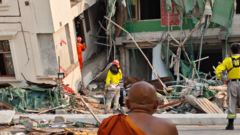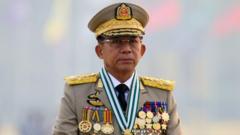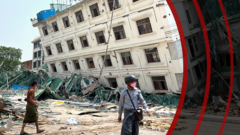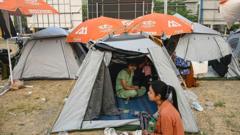As reports emerge of at least 14 military attacks since the ceasefire took effect, the situation highlights the difficulties of providing aid amidst a long-standing civil conflict intensified by a recent devastating earthquake.
Myanmar Conflict Persists Amidst Earthquake Ceasefires
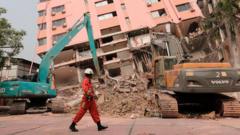
Myanmar Conflict Persists Amidst Earthquake Ceasefires
Fighting in Myanmar remains ongoing even as temporary ceasefires intended for earthquake relief are announced by both the military junta and rebel groups, complicating humanitarian efforts.
The recent 7.7 magnitude earthquake in Myanmar has exacerbated the already critical humanitarian crisis, with over 3,500 reported deaths and many areas remaining inaccessible to aid due to military restrictions.
Myanmar's humanitarian crisis continues to deepen as fighting persists, unnecessarily complicating relief efforts in the wake of a devastating earthquake. Temporary ceasefires were declared by both the military junta and a coalition of rebel groups to allow for relief operations after the quake struck on 28 March. However, these hold agreements have been undermined by ongoing military offensives.
Reports from the UN Human Rights office indicate that since the ceasefires were announced, the military has conducted at least 14 attacks. The military junta has shifted blame onto the rebel coalition for initiating violence, while the rebel groups argue that their actions are in defense against military provocations. Military spokesperson Maj Gen Zaw Min Tun declared that the military would retaliate if their bases were threatened.
UN High Commissioner for Human Rights, Volker Türk, has called for an immediate cessation of hostilities, urging the military to ensure that humanitarian organizations can access affected regions to provide necessary relief. This situation follows a devastating earthquake that has left thousands dead and displaced, with many areas still cut off from aid due to restrictive military policies.
Reports indicate that the official death toll stands at over 3,500, with thousands more injured or missing. Efforts to distribute food, water, and shelter are being hampered by ongoing hostilities and poor weather conditions, which also threaten operations. Aid workers warn of a "compounding crisis," as the earthquake's impact adds to the pre-existing humanitarian needs faced by millions already affected by conflict in Myanmar.
Aftershocks continue to be felt across the region, further traumatizing an already suffering population. The situation emphasizes the urgent need for a more comprehensive approach to humanitarian relief and conflict resolution in Myanmar.
Myanmar's humanitarian crisis continues to deepen as fighting persists, unnecessarily complicating relief efforts in the wake of a devastating earthquake. Temporary ceasefires were declared by both the military junta and a coalition of rebel groups to allow for relief operations after the quake struck on 28 March. However, these hold agreements have been undermined by ongoing military offensives.
Reports from the UN Human Rights office indicate that since the ceasefires were announced, the military has conducted at least 14 attacks. The military junta has shifted blame onto the rebel coalition for initiating violence, while the rebel groups argue that their actions are in defense against military provocations. Military spokesperson Maj Gen Zaw Min Tun declared that the military would retaliate if their bases were threatened.
UN High Commissioner for Human Rights, Volker Türk, has called for an immediate cessation of hostilities, urging the military to ensure that humanitarian organizations can access affected regions to provide necessary relief. This situation follows a devastating earthquake that has left thousands dead and displaced, with many areas still cut off from aid due to restrictive military policies.
Reports indicate that the official death toll stands at over 3,500, with thousands more injured or missing. Efforts to distribute food, water, and shelter are being hampered by ongoing hostilities and poor weather conditions, which also threaten operations. Aid workers warn of a "compounding crisis," as the earthquake's impact adds to the pre-existing humanitarian needs faced by millions already affected by conflict in Myanmar.
Aftershocks continue to be felt across the region, further traumatizing an already suffering population. The situation emphasizes the urgent need for a more comprehensive approach to humanitarian relief and conflict resolution in Myanmar.






